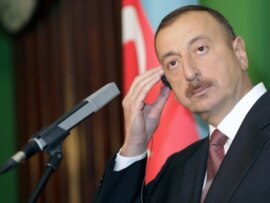Azerbaijan a model of tolerance, president says
| Publisher | Radio Free Europe/Radio Liberty |
| Publication Date | 7 April 2011 |
| Cite as | Radio Free Europe/Radio Liberty, Azerbaijan a model of tolerance, president says, 7 April 2011, available at: https://www.refworld.org/docid/4e20436023.html [accessed 27 May 2023] |
| Disclaimer | This is not a UNHCR publication. UNHCR is not responsible for, nor does it necessarily endorse, its content. Any views expressed are solely those of the author or publisher and do not necessarily reflect those of UNHCR, the United Nations or its Member States. |
April 07, 2011
 Azerbaijan's President Ilham Aliyev
Azerbaijan's President Ilham Aliyev
BAKU – Azerbaijani President Ilham Aliyev says his country can serve as an example to the world of national and religious tolerance, RFE/RL's Azerbaijani Service reports.
Addressing the World Forum on Intercultural Dialogue in Baku, Aliyev said that "everyone lives like one family in Azerbaijan. No national or religious confrontations or misunderstandings have existed here. We give preference to ensuring national and religious tolerance in Azerbaijan at the state level."
Some 435 people from 20 countries are participating in the forum, which lasts until April 9.
Attendees at the forum include Parliamentary Assembly of the Council of Europe President Mevlut Cavusoglu, Islamic Educational, Scientific and Cultural Organization (ISESCO) Director-General Abdulaziz bin Osman al-Tuveycri, and former Council of Europe Secretary-General Walter Schwimmer.
The Baku forum is an initiative of the Azerbaijani government with the support of the Council of Europe, the North-South Center, UNESCO, the UN Alliance of Civilizations, and ISESCO.
Despite President Aliyev's claims, however, Azerbaijan's record regarding ethnic and religious tolerance is not spotless.
Azerbaijan has had problems with some of its minority ethnic groups. For example, the Lezgin, Talysh, and Avar minorities complain periodically of being forcibly assimilated by state officials.
Aliyev also noted the ethnic conflict between Azerbaijanis and Armenians that centers on the dispute over the breakaway Azerbaijani region of Nagorno-Karabakh, which is controlled by Armenians.
"Azerbaijan is a newly-independent country," he said. "We have the Nagorno-Karabakh conflict; this country has suffered from ethnic cleansing. Azerbaijan has refugees and internally displaced people of some 1 million."
Aliyev didn't mention that in February 1988, Azerbaijanis responded to Armenian calls for the transfer of the then-Nagorno-Karabakh Autonomous Oblast to Armenian jurisdicition by killing dozens of Armenians in a three-day rampage in the coastal city of Sumgayit.
Hundreds of thousands of ethnic Armenians fled Azerbaijan during the six-year war over Karabakh, while similar numbers of Azerbaijanis fled Karabakh and adjoining regions of Azerbaijan that were taken by Armenian forces.
Additionally, in the past decade, authorities in the Azerbaijani exclave of Naxcivan have been accused of destroying ancient Armenian cemeteries.
The U.S. State Department wrote in its most recent religious-freedom report that Azerbaijan enforces "legal restrictions on religious freedom" that include bans on "the call to prayer in some areas." It says the government has also demolished and closed mosques, raided religious communities, and confiscated religious literature.
It said Jehovah's Witnesses and unsanctioned Muslim groups "were often targets" of harassment.
Meanwhile, the Baku-based opposition group Republican Alternative today quoted Council of Europe Secretary-General Thorbjorn Jagland as saying in a letter to Aliyev last month that the "intercultural dialogue" at the Baku forum would benefit Azerbaijanis only if Cavusoglu's participation results in the release of jailed Azerbaijani journalist Eynulla Fatullayev.
The European Court of Human Rights in Strasbourg has ordered that Fatullayev, who international rights groups say is being held on trumped-up charges because of his political activities, be released and paid compensation by the government.
Link to original story on RFE/RL website
